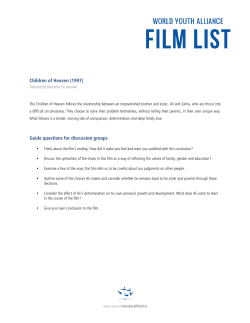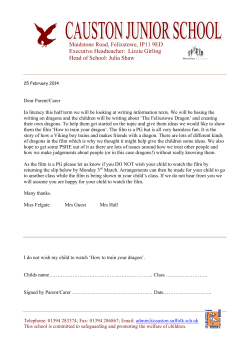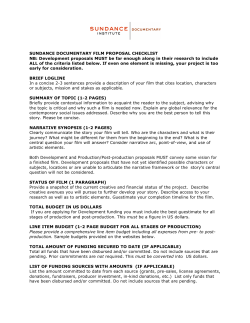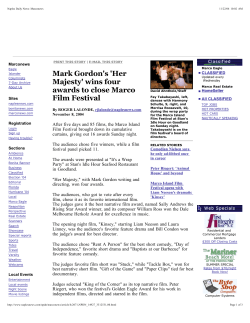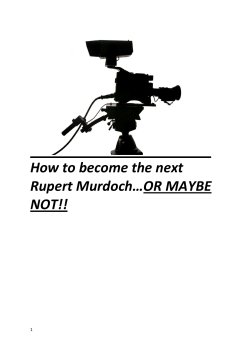
Tickets
Tickets SINGLE SESSIONS $11.50 full price $9.50 concession SUBSCRIPTIONS FULL SUBSCRIPTION 9 x film pass $78.00 full price 9 x film pass $70.00 concession HALF SUBSCRIPTION 5 x film pass $49.00 full price 5 x film pass $45.00 concession Full subscriptions admit you to one screening each of the films. Subscriptions are transferable but cannot be shared for the same session. Concessions are available to full-time students, unemployed, pensioners, members of the Alice Springs Film Society and Friends of the Festival. Bona Fide ID must be presented. Please note. Admission to all unclassified films is restricted to people 18 years and over. Above: Takeshi Kitano as Zatoichi How to book SINGLE SESSION TICKETS On sale at the Box Office 30 minutes before each session VENUE / BOX OFFICE Araluen Arts Centre Larapinta Drive Alice Springs NT 0870 Tel (08) 8951 1122 Above: Marco Solo Book by FAX: Credit Cards only (BCARD/MCARD/VISA/AMEX) to the Travelling Film Festival (02) 9280 1520 Book by mail: Cheque/Credit Cards to Travelling Film Festival PO Box 96 Strawberry Hills NSW 2012 SUBSCRIPTIONS On sale in advance from venue Box Office or from the Sydney Film Festival Please make cheques payable to the Sydney Film Festival Book by email: info@sydneyfilmfestival.org The Travelling Film Festival visits... NT: Alice Springs, Katherine, Darwin QLD: Bundaberg, Mackay, Cairns, Townsville NSW: Dubbo, Wagga Wagga, Wollongong, Bowral, Bowraville, Laurieton, Huskisson Sponsors Sydney Film Festival acknowledges the support of the Australian Film Commission and NSW Film and Television Office Presented by Sydney Film Festival PO Box 96 Strawberry Hills NSW 2012 Tel (02) 9280 0511 Fax (02) 9280 1520 info@sydneyfilmfestival.org w w w. s y d n e y f i l m fe s t i v a l . o rg On Tour Sydney Travelling Film Festival Alice Springs Araluen Arts Centre 18–21 February 2005 On the road with the best on screen This is a slowburning movie, a character study set against a creepy background... it’s the Australian ‘Blair Witch’ Opening Night Lost Things Australia/Dir: Martin Murphy/2004/84mins/English language (M) Is death the ultimate horror - or is there something in our destiny? This return to basics for the psychological horror genre is fresh and unpredictable, with top performances and an intelligent script. Simply made on a low budget, the film proves that it’s your imagination and the quality of your story telling not the size of your budget that ultimately matters. Four teenagers set off for a weekend of surf n’ sun. Where this film deviates immediately from the standard fare of this genre is in its characterisations. Each of the characters is uniquely identifiable, and not as a stereotype. The originality is followed through the layers of their conversations which touch on real Margaret Pomeranz At The Movies, ABC TV issues facing teenagers in an adult world. Our attention is held through a combination of humour and drama as the adventure begins to fracture - and the mystery of what’s happening deepens. The filmmakers’ search for a fresh group of young actors has proved highly successful; each of them delivering a terrific characterisation. The introduction of a mysterious element that provides the source of fear is carefully orchestrated to be both accessible and just out of sight. Martin Murphy’s direction is assured and keeps us involved, off balance and entertained. The film is aided by a fine, restrained score from Carlo Giacco, and the ideas that drive Stephen Sewell’s clever script are worthy of our investment. – Andrew Urban, UrbanCinefile ••••• The Projectionist Australia/Dir: Michael Bates/2002/14mins/English language (M) Grand Prix Tampere Film Festival 2003 ‘The Projectionist’, inspired by Rachmaninov’s composition ‘The Isle of the Dead’, threads together a story about an old cinema projectionist and an elaborate series of huge projected images which represent his memories. He is a 21st century ‘everyman’ whose complex mind is burdened with too many overlapping memories. His individual suffering resonates, ironically because it is invisible to everyone but himself. The ghostly visions which appear in ‘The Projectionist’ reflect his personal history and private pain. Above: Facing Windows In My Father’s Den New Zealand/Dir: Brad McGann/126mins/2004/English language (MA) FIPRESCI Award Toronto Audience Award San Sebastian A tale of secrets, betrayal and the consequences of living in denial, silence and fear. Paul Prior (Matthew Macfadyen), a world-weary photojournalist returns home to New Zealand after the death of his father. It’s been seventeen years since he left and his brother Andrew (Colin Moy) is stunned by his sudden, unannounced visit. The two siblings worlds apart in temperament, beliefs and life experience - attempt to renew their troubled relationship. Pressured by his brother to stay longer, Paul is charged with arranging the sale of their father’s estate. Revisiting his father’s cottage unearths long suppressed memories for Paul. When he meets the disconnected sixteen-year-old Celia who actively pursues him - fascinated by his cynicism and experience of the world beyond her small-town existence - an unlikely friendship develops. Paul recognises something of himself in Celia: the passion for writing, a thirst for knowledge and experience; qualities that have been tarnished by his constant exposure to the front lines of the world. When Celia goes missing Paul, as the outsider, is immediately blamed for her disappearance. Mounting suspicions turn to violent encounters. The past finally catches up as the truth emerges in this taut, edge-of-your-seat drama. – Sydney Film Festival The Year My Voice Broke Australia/Dir: John Duigan/1987/105mins/English language (M) A beautiful coming-of-age drama set in country New South Wales in 1962. Danny (Noah Taylor) an awkward fifteen year-old, watches painfully as his best friend and first love, the slightly older Freya (Leone Carmen), blossoms into womanhood and falls for trouble maker Trevor (Ben Mendelsohn). As the relationship between Freya and Trevor deepens and Danny is left f u rther behind, a series of events unfold which will irreversibly change the lives of everyone involved forever. We Have Decided Not To Die Australia/Dir: Daniel Askill/2003/11mins/ English language (M) Audience Award Clermont-Ferrand Film Festival Spring, Summer, Autumn, Winte r...and Spring Korea/Dir: Kim Ki-duk/2003/101mins/Korean language English subtitles (MA) An exquisitely simple movie, the film concentrates its focus on the relationship between a Buddhist monk and his young protege. The master and his protege live in extreme isolation; their small wooden house, on a raft in the middle of a lake is the only habitation for miles around. The story e f f o rtlessly joins the cycle of the seasons, to become part of the larger rhythms of life. Along the way there are numerous surprises...by the end when you are back at Spring with a young acolyte and a gray-haired master - the film takes on the heft and gravity of one of the smooth stone Buddha's that decorate the old monk’s house. It seems less a modern work of art than a solid, ancient object that has always been there, waiting to be found.– New York Times Zatoichi Japan/Dir: Takeshi Kitano/200/115mins/Japanese language with English subtitles (MA) Action stations!! That incredible Japanese institution, Takeshi Kitano - action maestro, art-house auteur, slapstick comic and kids’ television favourite - has made a film which combines all of his talents. Kitano is ideally placed for his thrilling new samurai picture, which somehow manages also to be a musical, a comedy and a gentle exploration of the countryside. Set in the 19th century, the film has Kitano as a Japanese blind masseur and itinerant wiseguywarrior Zatoichi, a legendary character familiar in Japan. Zatoichi walks the earth with his pre t e r n a t u rally enhanced hearing and reflexes, i n variably encountering bullies who think they can take advantage of his vulnerability. It’s at this point Zatoichi’s sword is unsheathed from his blind-man’s cane and he wreaks mayhem in sizzling fight scenes where crimson spouts of blood are stylised, indirect, almost abstract. It’s simply a very entertaining film. – The Guardian A stunning visual experience which achieved the runner-up prize at the 2003 BAFTA Awards. ‘We Have Decided Not To Die’ is about a mental state where logic drops away and anything is possible. An audio visual narrative that uses sound, stunts and visual effects to create a world w h e re characters float in space and time. It tells the story of three characters’ modern day journeys of transcendence; journeys into a place where death is no longer inevitable. The Story of the Weeping Camel Germany/Dirs: Byambasuren Davaa, Luigi Falorni/2003 /93mins/Mongolian language with English subtitles (PG) D o n’t miss this hit of the 2004 Sydney Film Fe s t i val! A family of nomadic shepherds in the Gobi Desert of Southern Mongolia use a t raditional music ritual to try and save the life of a ra re white baby camel after it is rejected at birth by its mother. This narra t i ve documentary has a rhythm and beauty to it that fits with the ethnographical n a t u re of its subject matter so well that it’s hard Zatoichi is a hugely entertaining movie from one of Japan’s most talented filmmakers – David Stratton, At The Movies, ABC TV Clockwise from top left: The Story of the Weeping Camel; Spring, Summer, Autumn, Winter... and Spring; Control Room; and Since Otar Left. to know where the documentary ends and the fiction begins. The actors are the real nomads who played out their daily lives before the camera, with some re-enactments for the filmmakers. They are delightful, beautiful people, especially young Ugna who practically steals the film from the camels. The style of direction, simple still shots, reflects the lives depicted. And the landscape is stunning. – Margaret Pomeranz, At the Movies, ABC TV Control Room USA/Egypt/Dir: Jehane Noujaim/2003/84mins/English language (M) FIPRESCI Award Sydney Film Festival 2004 Banned from several Arabic countries because of its critical stance, ‘Control Room’ was also hailed as a mouthpiece for Osama Bin Laden by President Bush. In the film, Al Jaze e ra’s role as the most popular news channel in the Arab world, catering to an audience of over 40 million, is observed by filmmaker Jehane Noujaim as the channel’s journalists re p o rt on the escalating war. Caught between a rock and a h a rd place is the media liaison officer of the United States Armed Fo rces, Lieutenant Josh Rushing. What is journalistic objectivity in a situation like this? ‘Control Ro o m ’ g i ves insight into the concept of journalistic integrity and how each side may see the other betraying that ethic. – Marg a ret Po m e ranz, At the Movies, ABC T V Since Otar Left Facing Windows France/Georgia/Dutch/Dir: Julie Bertuccelli/2003/100mins/ French, Georgian and Russian languages with English subtitles (M) I t a l y/Dir: Ferzan Ozpetek/2003/106mins/Italian language with English subtitles (M) GRAND PRIZE INTERNATIONAL CRITICS WEEK CANNES 2003 The return of great Russian filmmaking. A subtle story of a lie for love that changes the lives of three generations of women in today’s Georgia. ‘Since Otar Left’ is an exquisitely bittersweet drama set in Tbilisi, the crumbling capital of the post-Soviet republic of Georgia. Three women - the stoically beautiful Ada (Dinara Droukarova), her lusty mother Marina (Nino Khomassouridze) and whip-smart grandmother Eka (Esther Gorintin) - live together in an apartment. When news comes that Marina’s brother Otar has been killed while working in France, Marina and Ada decide to conceal his death rather than break Eka’s heart. Otar’s death amplifies the fantasies, failings and buried aspirations each woman had projected onto his achievements and ultimately becomes a catalyst for change. – Filmink Marco Solo Australian/Dir: Adrian Bosich/2005/10mins/English language In the darkest days of WWII, a young baker’s apprentice suddenly murders his employer before taking to the empty midnight streets, frantically searching for someone or something...a haunting image of passion, rage and desperation. Giovanna has been married to her devoted husband Filippo for 9 years. The burden of responsibility for the family begins to show when they come across an elderly gentleman on the street who appears lost and confused. Giovanna doesn’t want to get involved but her husband Filippo feels compelled to take the stranger home. Irritated by her husband’s decision, Giovanna’s begins to fantasise about her idea of the perfect man the handsome and mysterious neighbour that she watches through her window at night. As Giovanna helps the elderly man search for his past an enduring friendship develops between the unlikely pair. Combining elements of mystery, love story and historical rumination, ‘Facing Windows’ is about finding and fulfiling one’s destiny; as two women, one husband, the man in the window and the elderly stranger are brought together. Poor Marco. Accidentally born into an overcrowded Australian-Italian household, he is relegated to his parents' bedroom. Nine years later, armed with a vivid imagination, an obsession with Dame Edna Everage, and a warped sense of Catholicism, Marco fights for a space of his own. Screening Times 18–21 February 2005 Friday 18th 7.30pm The Projectionist (M) (short) followed by Lost Things (M) Saturday 19th 1.00pm Spring, Summer, Autumn, Winter, Spring...(MA) 3.15pm Since Otar Left (M) 7.00pm Control Room (MA) 9.00pm In My Father’s Den (MA) Sunday 20th 1.00pm The Year My Vo i ce Broke (M) 3.00pm Marco Solo (short) followed by Facing Windows (M) 6.00pm We Have Decided Not To Die (M)(short) followed by The Story of the Weeping Camel (PG) 8.00pm Zatoichi (MA) Monday 21st 5.30pm In My Father’s Den (MA) 8.00pm Since Otar Left (M)
© Copyright 2025
